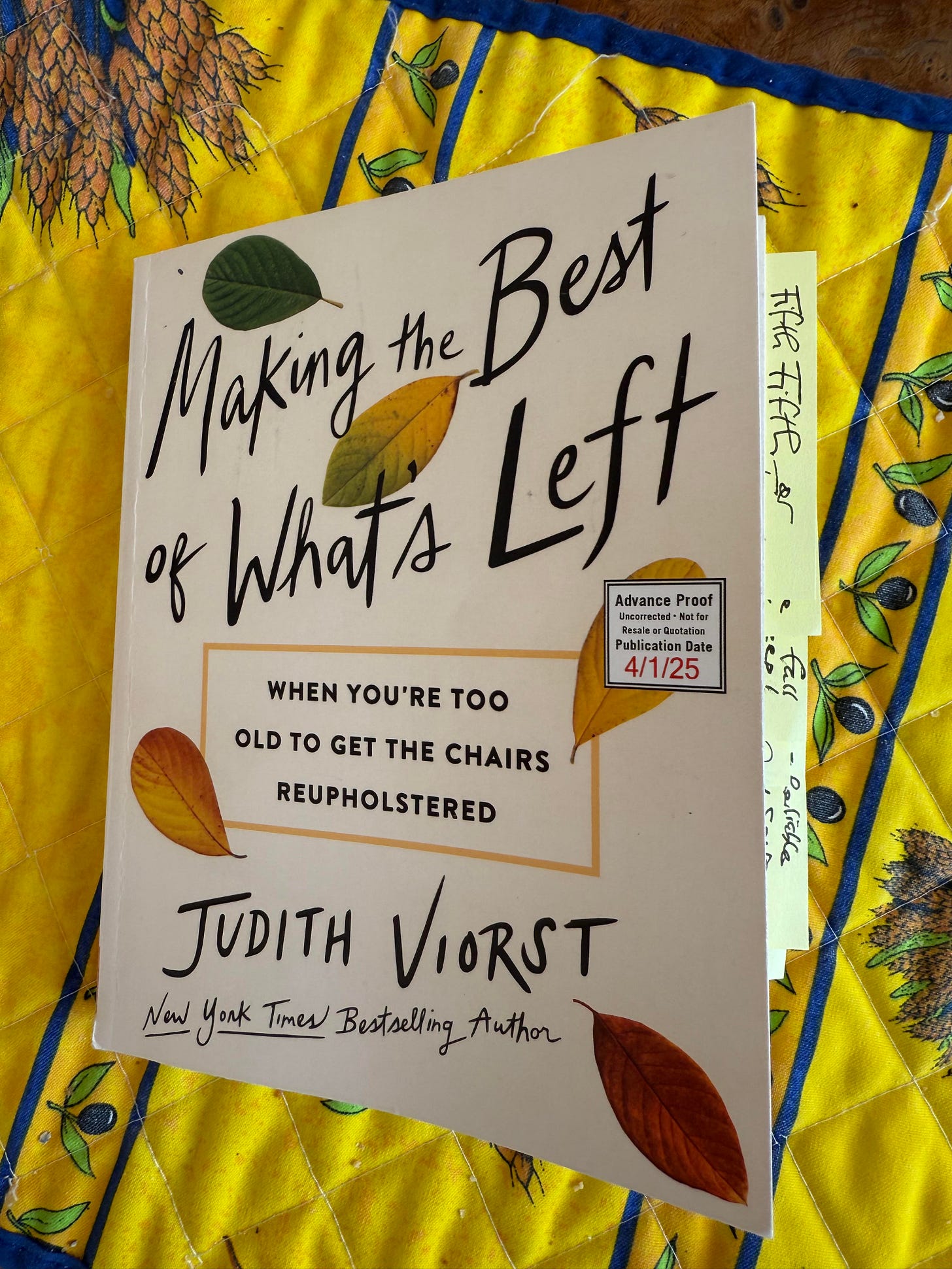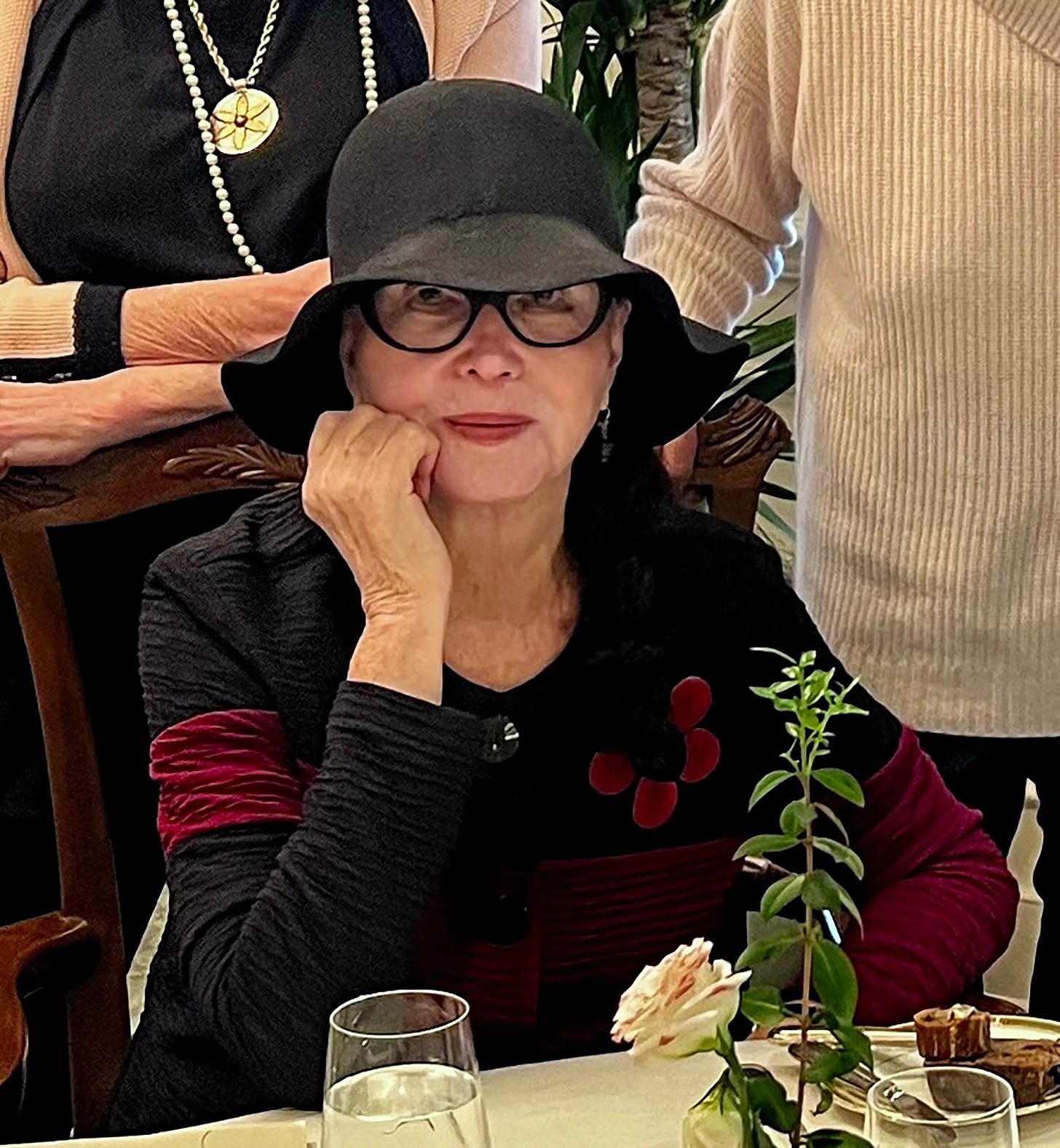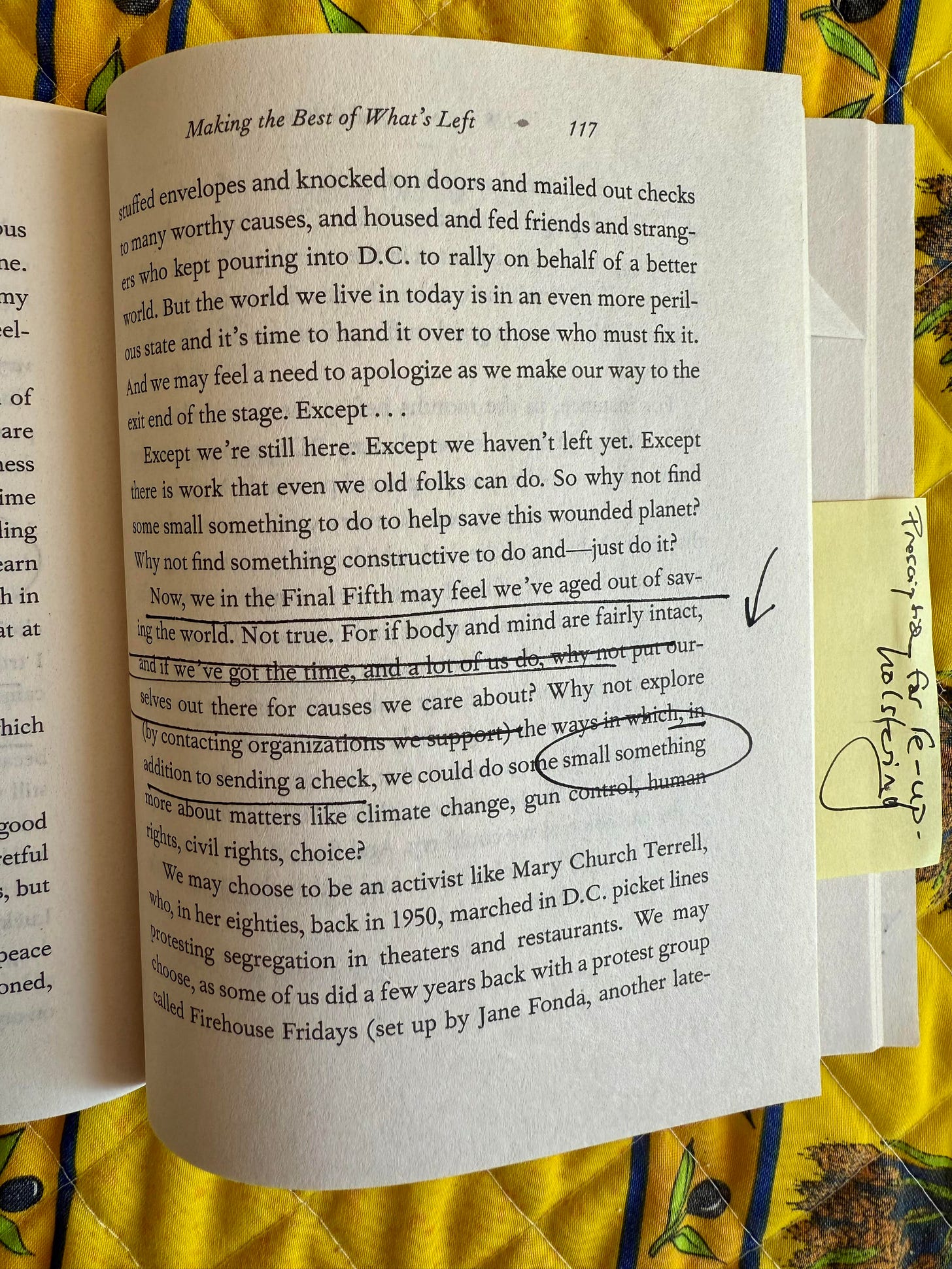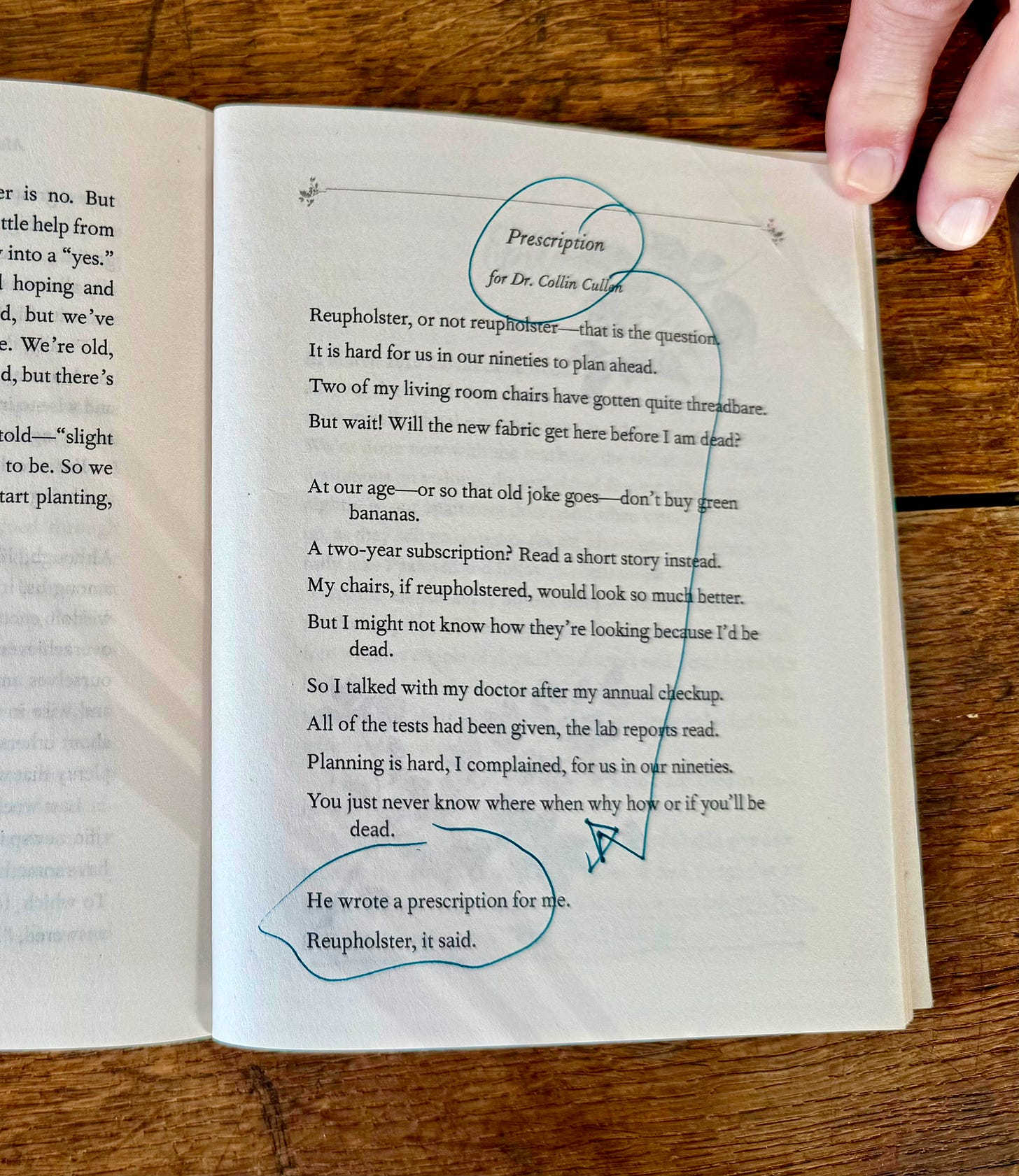Judith Viorst, 94, doesn’t want to flunk old age
The legendary author gives herself a B, so far
“…we shouldn’t wait til (a spouse’s) death to figure out how to be a person, not only a wife.” - Judith Viorst (Making the Best of What’s Left, page 35)

If there’s a primer for [B]old Age, it’s Judith Viorst’s new book, Making the Best of What’s Left. At 94, Judith, the author of over 40 books1 for both children and adults (including the mega bestselling Alexander and the Terribile, Horrible, No Good, Very Bad Day), has a realistic perspective on what she calls the “Final Fifth of Life” (80 to 100).
I think she nails it; she writes with humor and a deft touch about the balance between acceptance and defiance of old age (i.e. “the blessings AND the bullshit”)—exactly what I’m trying to articulate in this newsletter!
She covers the topics so many of us can relate to: invisibility, needing and finally accepting help, driving around the block to avoid turning left at an intersection, pondering the hereafter, the meaning of immortality (Judith’s hope is simply to be remembered); and she does it with her signature wit.
Best of all, despite being a legendary bestselling author, as well as a psychoanalytic researcher2, she is not pretentious. Sprinkled throughout Making the Best are sections in ALL CAPS, as well as the liberal use of exclamation points (!!), both generally frowned upon in “serious” nonfiction.
I so admire Judith and wish I could have gotten to know her during my decades in DC; it turns out we were neighbors in Cleveland Park! An even greater coincidence, she knew my parents and saw my husband
as one of her doctors! She wrote me in an email:“YOUR FOLKS WERE MY AND MILTON’S FRIENDS… YOUR HUSBAND WAS MY MUCH MISSED DOCTOR WHO, IF HE IS RETURNING3 TO PRACTICE GASTROENTEROLOGY, I AM READY TO SIGN UP WITH AGAIN. JUDY”
Judy’s prescription for “making the most” of old, old age is to laugh a lot, to say “I love you” frequently to those you cherish (she wishes she could have said a proper goodbye to her husband Milton, who died, suddenly, of Covid in 2022), and to really, truly seize the day and appreciate the present moment. In her book, she cites poet Jack Gilbert’s powerful prayer:
“Teach me mortality.
Frighten me into the present.
Help me to find the heft of these days.”
- Jack Gilbert4
I should mention that Judith has written a whole library of decade-related books (for 30, 40, 50, 60, 70, 80, and “nearing 90”), which are also a lot of fun to read5. It’s a wonder to meet someone who has been interested in aging for 70+ years!
And now for a Q&A with this remarkably [b]old woman. And don’t miss the questions for you, dear reader, at the bottom.

Debbie Weil: What is your morning ritual? Tell us everything! What time do you get up? Coffee? What do you do first? Do you write everyday?
Judith Viorst: I get up early-7ish. Weigh myself6. Despite my weight, drink chocolate milk for breakfast. Shower and read the papers unless I’m deeply into writing something, in which case I’ll go to my home office unwashed, untoothbrushed, still in my nightie and write for several hours.
DW: You write in Making the Best: “I don’t want to flunk old age. I want to be really good at old age… I want an A-plus.” What grade are you giving yourself at 94?
JV: Grade B. I need to get better at worrying less and spend more time embracing my fortunate life—each day, every day—if I want a higher grade.
DW: What is your secret for seeing the humorous side of life, even after the most difficult loss, the death of your husband?
JV: First I cry. The humor follows my fully feeling the sorrow of what I have lost. This can take a while.
A poem for her husband:
“I have these conversations with my husband, I’m hoping that he’s hearing what I’ve said. For though I know he died this past December, I keep on telling him, Stop being dead… I need you sitting at our kitchen table, I need you lying next to me in bed. I need you fixing our damn circuit breakers. I need you! Stop being dead.” - Making the Best, page 65.
DW: You write about the challenge, for most widows, of living alone. Can you say anything about loneliness? What is one thing you are especially enjoying about being on your own?
JV: Loneliness, for some widows, has to do with being uncoupled, not part of a pair. I am only specifically lonely for my husband. I do enjoy sometimes not sitting down to dinner but just leaning against the fridge and eating a yogurt. My husband, a serious diner, would never have put up with that.
DW: What does [b]old age mean to you?
JV: The freedom to do what I want to do, within the limits set by my body and mind and other realities and necessities…
“Old age isn’t just a state of mind, no matter how perky and positive we may be. It’s also a nonnegotiable reality. Our body no longer does all the things we want it to do.” - Making the Best, page 19
DW: Do you believe in the importance–and effectiveness–of citizen resistance, specifically against the Trump administration?
JV: I will always be, to a greater or lesser extent, politically active, and will do some more writing about it one of these days. Meanwhile, see my new book… which encourages folks even in their final fifth to help save the world.
“Now, we in the Final Fifth may feel we’ve aged out of saving the world. Not true. For if body and mind are fairly intact, and we’ve got the time… Why not explore… the ways in which, in addition to sending a check, we could do some small something more… ” - Making the Best, page 117
DW: You also write in your new book about not wanting to be a burden or a duty to your family (especially children and grandchildren). I already feel that way, sometimes, at 73. What tips can you offer for how to “be fun” and “not needy”?
JV: I have a life of my own, interests in what’s happening in the world, and great interest in what’s going on with my family. I’m a good questioner and listener, and a good date for dinner and a movie.
DW: What have you learned about expressing, and feeling, gratitude?
JV: I don’t keep appreciation, admiration, loving feelings, or a compliment to myself. I like to let those I admire, appreciate, look up to, and love know that I do. It’s nice for all of us.
“... if I were only allowed one word to describe what I most value about myself, what leaps to mind is… RELIABLE… if I had two words to describe my proudest achievement, those words would unquestionably be MY SONS.”
- Making the Best, page 87
DW: What’s the biggest surprise about reaching what the demographers call old, old age (your 90s)?
JV: I am as interested in people and what’s happening in the world as I’ve ever been.
Re the subtitle of her book, Judith writes a poem to one of her doctors in DC:
“Reupholster, or not reupholster–that is the question. It’s hard for us in our nineties to plan ahead. Two of my living room chairs have gotten quite threadbare. But wait! Will the new fabric get here before I am dead?… “
At the bottom of the page is the doctor’s one-word prescription: ‘Reupholster.”
DW: Are you afraid of death or dying?
JV: Like other people who’ve given this matter some thought, I aspire to a kindly and dignified death.
“Though he’s probably not coming back to me, despite my repeated requests, I talk to my husband and think about him–a lot, especially at night when I am lying in bed. For instead of counting sheep when I have difficulty sleeping, it’s become my habit to count and name the dead.” - Making the Best, page 67
Judith Viorst is the author of the beloved Alexander and the Terrible, Horrible, No Good, Very Bad Day, which has sold some four million copies; the Lulu books, including Lulu and the Brontosaurus; the New York Times bestseller Necessary Losses; four musicals; and poetry for children and adults. Making the Best of What’s Left is her latest book. She lives in Washington, DC and has three sons, Anthony, Nicholas, and Alexander (yes, the Alexander of the book); and seven grandchildren.
Questions for readers
How are you thinking about your Final Fifth of Life?
What is your favorite answer from Judith?
If you were only allowed one word to describe what you most value about yourself, what would it be? I think mine is [B]OLD...
I hope you enjoyed reading this as much as I enjoyed emailing back and forth with Judith! It’s one in a series of popular Q&As with [b]old women, about their writing and their life. - Debbie
She is perhaps best known for her 1972 children’s book, Alexander and the Terribile, Horrible, No Good, Very Bad Day (all three of my children loved it) and for her New York Times bestseller Necessary Losses, a psychological study of love, loss, and letting go.
In 1981, she became a research graduate at the Washington Psychoanalytic Institute after six years of study.
After 30+ years in DC, Sam and I left in 2013 to “reinvent” ourselves. He retired from medical practice and we now live on the coast of Maine and in New Haven, CT.
Excerpt from a poem by Jack Gilbert (Making the Best, page 157)
Judith is not the only [b]old woman with a preoccupation with her weight; I wrote about that here: Mirror, Mirror
![[B]OLD AGE with Debbie Weil](https://substackcdn.com/image/fetch/$s_!i8Z0!,w_80,h_80,c_fill,f_auto,q_auto:good,fl_progressive:steep,g_auto/https%3A%2F%2Fsubstack-post-media.s3.amazonaws.com%2Fpublic%2Fimages%2Fdaaca764-d8d6-4a1b-bf58-61dbb72810fc_842x842.png)
![[B]OLD AGE with Debbie Weil](https://substackcdn.com/image/fetch/$s_!fEcd!,e_trim:10:white/e_trim:10:transparent/h_72,c_limit,f_auto,q_auto:good,fl_progressive:steep/https%3A%2F%2Fsubstack-post-media.s3.amazonaws.com%2Fpublic%2Fimages%2F95ad4442-e435-4ebc-a8d2-9c9b89a8bdb6_2100x400.png)

![[B]OLD AGE with Debbie Weil](https://substackcdn.com/image/fetch/$s_!i8Z0!,w_36,h_36,c_fill,f_auto,q_auto:good,fl_progressive:steep,g_auto/https%3A%2F%2Fsubstack-post-media.s3.amazonaws.com%2Fpublic%2Fimages%2Fdaaca764-d8d6-4a1b-bf58-61dbb72810fc_842x842.png)






I’ve been visiting my closet where I keep yarn, knitting patterns, fabric, needlepoint canvases that didn’t get a design and quilting squares cut out and ready to go. I ask myself at 75, how many of these dreams should I give away? I am, however, moving forward with a plan to reupholster thanks to Judith. Thanks Debbie for introducing us.
Enjoyable interview. I have a related problem inasmuch as our living room furniture is really falling apart and needs replacing – not simple re-upholstering. We are in our early-mid 80s and it seems a foolish waste of money to buy new stuff now. I wrote a post about this on another platform (sixtyandme.com) and had 70+ responses on the issue - about ten times what I usually get. Getting old really does raise some unexpected issues!